Unit7 Travelling in Garden City 第1课时 基础知识及拓展(课件)(共22张PPT)
文档属性
| 名称 | Unit7 Travelling in Garden City 第1课时 基础知识及拓展(课件)(共22张PPT) | 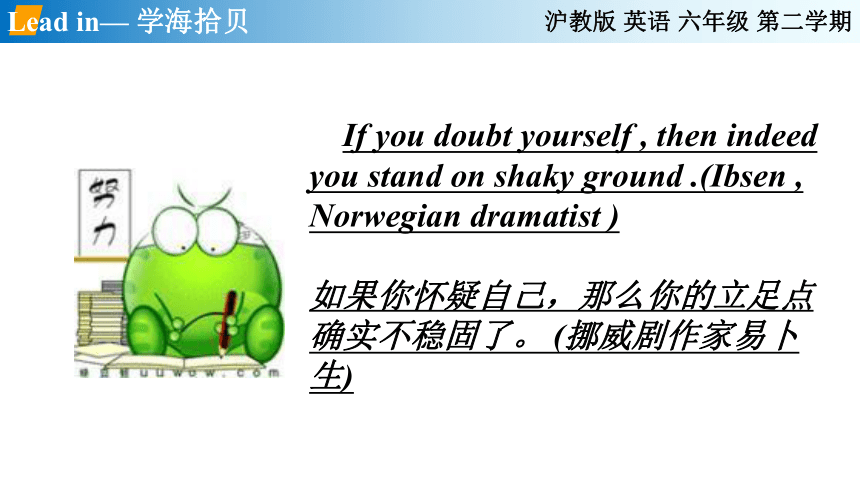 | |
| 格式 | pptx | ||
| 文件大小 | 179.5KB | ||
| 资源类型 | 试卷 | ||
| 版本资源 | 牛津上海版(试用本) | ||
| 科目 | 英语 | ||
| 更新时间 | 2022-05-21 06:48:07 | ||
图片预览

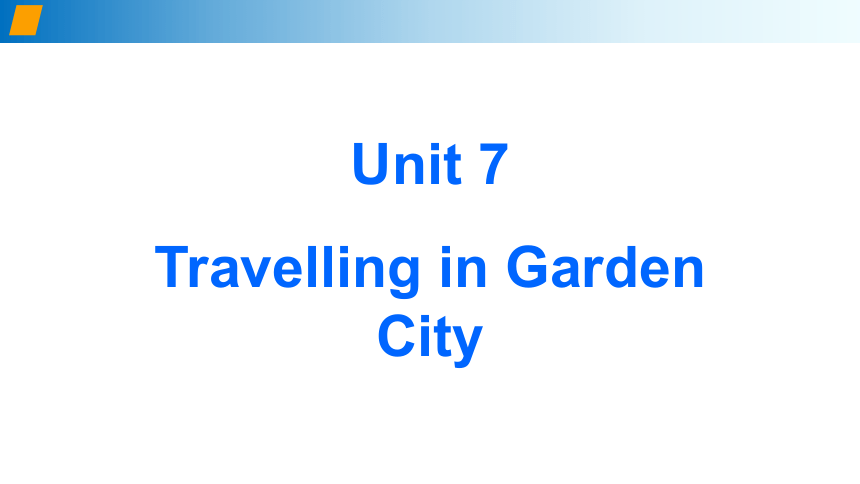

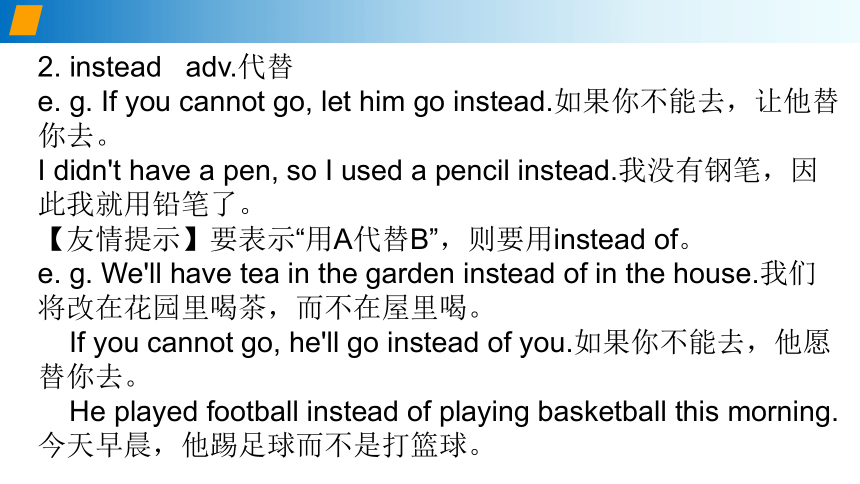

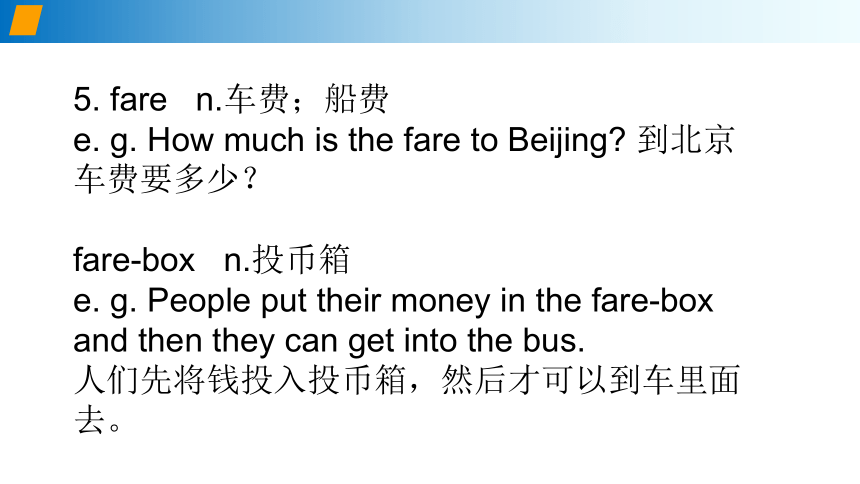
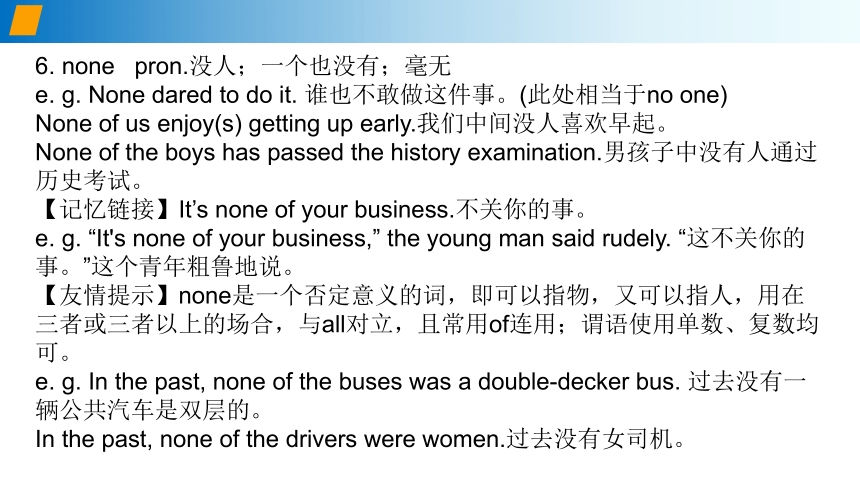
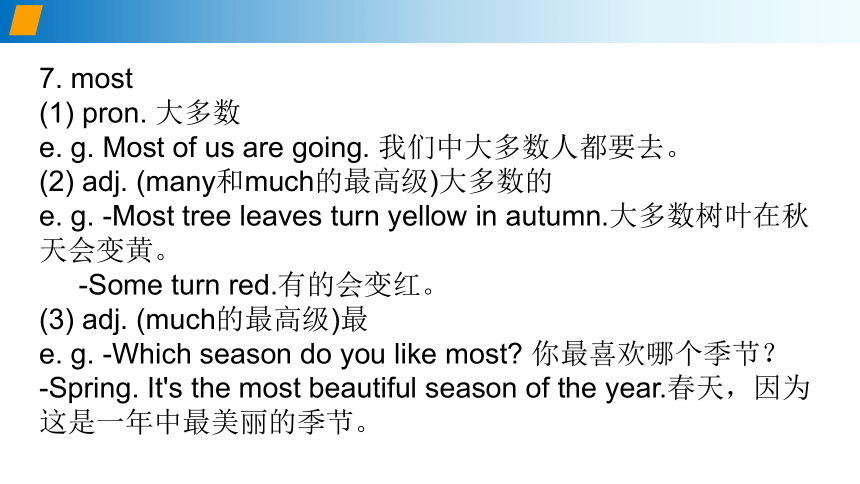
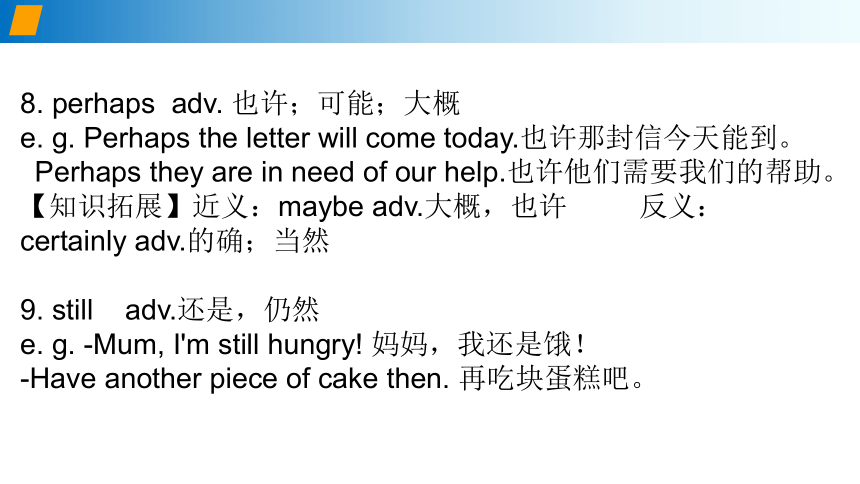
文档简介
(共22张PPT)
Lead in— 学海拾贝
沪教版 英语 六年级 第二学期
If you doubt yourself , then indeed you stand on shaky ground .(Ibsen , Norwegian dramatist )
如果你怀疑自己,那么你的立足点确实不稳固了。 (挪威剧作家易卜生)
Unit 7
Travelling in Garden City
一、单词讲解
1. public adj.公众的,公共的
e. g. Everyone can borrow books from public libraries. 每个人都可以从公共图书馆借书。
【知识拓展】 n.公众
e. g. -Is the museum open to the public 这家博物馆对公众开放吗?
-Not yet, but it will soon. 还没有,但很快会的。
【记忆链接】public opinion公共舆论
2. instead adv.代替
e. g. If you cannot go, let him go instead.如果你不能去,让他替你去。
I didn't have a pen, so I used a pencil instead.我没有钢笔,因此我就用铅笔了。
【友情提示】要表示“用A代替B”,则要用instead of。
e. g. We'll have tea in the garden instead of in the house.我们将改在花园里喝茶,而不在屋里喝。
If you cannot go, he'll go instead of you.如果你不能去,他愿替你去。
He played football instead of playing basketball this morning.今天早晨,他踢足球而不是打篮球。
3. transportation n. 交通;运输
e. g. The transportation in our city is very convenient. 我们城市的交通运输非常方便。
4. nowadays adv.现在.现今;如今
e. g. Nowadays, advertisements can be found everywhere in any big city.
现在,在任何一个大城市里,到处都可以看到广告。
5. fare n.车费;船费
e. g. How much is the fare to Beijing 到北京车费要多少?
fare-box n.投币箱
e. g. People put their money in the fare-box and then they can get into the bus.
人们先将钱投入投币箱,然后才可以到车里面去。
6. none pron.没人;一个也没有;毫无
e. g. None dared to do it. 谁也不敢做这件事。(此处相当于no one)
None of us enjoy(s) getting up early.我们中间没人喜欢早起。
None of the boys has passed the history examination.男孩子中没有人通过历史考试。
【记忆链接】It’s none of your business.不关你的事。
e. g. “It's none of your business,” the young man said rudely. “这不关你的事。”这个青年粗鲁地说。
【友情提示】none是一个否定意义的词,即可以指物,又可以指人,用在三者或三者以上的场合,与all对立,且常用of连用;谓语使用单数、复数均可。
e. g. In the past, none of the buses was a double-decker bus. 过去没有一辆公共汽车是双层的。
In the past, none of the drivers were women.过去没有女司机。
7. most
(1) pron. 大多数
e. g. Most of us are going. 我们中大多数人都要去。
(2) adj. (many和much的最高级)大多数的
e. g. -Most tree leaves turn yellow in autumn.大多数树叶在秋天会变黄。
-Some turn red.有的会变红。
(3) adj. (much的最高级)最
e. g. -Which season do you like most 你最喜欢哪个季节?
-Spring. It's the most beautiful season of the year.春天,因为这是一年中最美丽的季节。
8. perhaps adv. 也许;可能;大概
e. g. Perhaps the letter will come today.也许那封信今天能到。
Perhaps they are in need of our help.也许他们需要我们的帮助。
【知识拓展】近义:maybe adv.大概,也许 反义:certainly adv.的确;当然
9. still adv.还是,仍然
e. g. -Mum, I'm still hungry! 妈妈,我还是饿!
-Have another piece of cake then. 再吃块蛋糕吧。
10. few adj.很少,几乎没有
e. g. -Are there many fish in the pond 池塘里鱼多吗?
-Very few. 很少。
【用法小贴士】few和little是“几乎没有”的意思,a few和a little是“有一些”的意思。few和a few用于修饰可数名词,如a few books(几本书)。little和a little用于修饰不可数名词,如a little milk(一点儿牛奶)。
11. motorcycle n. 摩托车
e. g. -Can you ride a motorcycle 你会骑摩托车吗?
-No, but I can drive a car.不会,但我会开汽车。
12. traffic n.交通
e. g. -Traffic jam again! 又堵车了!
-There is a lot of traffic at this time of the day.每天这个时候车都很多。
13. railway n.铁路,铁轨
e. g. -Why was the train late 火车为什么晚点了?
-There was a railway accident.铁路出事故了。
【记忆链接】railway station火车站 railway worker铁路工人
【用法小贴士】railway是英国英语,美国英语用railroad。
14. poster n.招贴画;海报
e. g. a poster advertising the circus宣传马戏团的海报
Her bedroom is hung with posters.她的卧室里挂着一些大海报。
15. crossing n.人行横道,十字路口
e. g. Turn right at the first crossing, and you will see the garden. 在一个十字路口处向右拐,你将会看到花园。
16. bridge n.桥
e. g. -How can we cross the river 咱们怎么过河呀?
-There's a bridge over there.那边有座桥。
【百科小贴士】世界上最古老的石拱桥是中国的赵州桥,世界上最长的桥在美国路易斯安那州。
【随堂小练】
I. Complete the sentences用所给词头完成句子
1. Many people like t__________ by bus.
2. In the p_______, they lived a poor life,
3. He used to c________ money from the passengers and put it in the bag.
4. This is an a______________ room. It’s rather cool.
5. Most of us are bus d___________. We like our jobs.
1.Traveling 2.past 3.collect 4.air-conditioned 5.drivers
plete the sentences with the given words in their proper forms 用括号中单词的适当形式填空。
1. The buses move _____in a big traffic jam on Sichuan Road. (slow)
2. Is there _____traffic on this road
A. many B. a lot C. a lot of D. a
3. He travels _______(a lot, a lot of )and has been to many palace.
4. --What will Shanghai _____in fifteen years’ time (like)
--I think it will be more beautiful.
5.I sleep in afternoon f_____two hours on summer holidays.
6. The meeting room is ________. It’s cool to stay in it. ( air-conditioner)
7. Trains are faster than ________. (bus)
8. ________ of the students are girls. Only a few of them are boys. ( many )
9. You made ________mistakes in your homework than before. ( few)
10. Alice is a _________. She likes _________. ( dance )
11. Listen Lili _________ an English song in the next room. ( sing )
12. The little boy liked _________books in the library. (read)
13. What ________ Peter_______ like in the future ( be )
slowly
C
a lot
be like
for
air-conditioned
buses
Most
a few
Dancer
dancing
singing
reading
will
be
Ⅲ.选择并抄写单词
1. In the past, people liked ______ (travel, traveling) by bus.
2. All of the _______ (passengers, drivers) had to buy tickets on the bus years ago.
3. _______ (None , Some ) of them is late for school today.
4. The Olympic Games will be held in Beijing in two ______ (year’s, years’) time.
5. They go to work by _______ (ferry, ferries).
1. traveling 2. passengers 3. None 4. years’ 5. ferry
Daily expressions. 日常表达
traveling in Garden City 花园城的出行
travelling by bus∕ferry∕underground 乘公共汽车/渡船/地铁出行
a single-decker bus 一辆单层汽车
a double-decker bus 一辆双层汽车
a fare box 一个投币箱
a public transportation card 一张公共交通卡
an air-conditioned bus 一辆空调车
in the past 在过去
in 10 years’ time 十年后
all passengers 所有的乘客
buy tickets from 从......买票
collect money from the passengers 从乘客那里收钱
have to do sth.(don’t have to do sth.) 不得不;必须(不必)
put their money in a fare box 把钱放进投币箱
use sth. instead 用......替代
all of 全部的......
most of 大部分的......
some of 一些......
none of 没有一个......
be like 像......
fewer traffic jams 少一些交通阻塞
more underground stations 更多的地铁站
light rail 轻轨
traffic lights 交通灯
car parks 停车场
discuss sth. with sb. 和...讨论
*think about 考虑;思考;想一想
*kinds of transport 交通方式
*make a poster about 制作一张有关......的海报
I. Translate the following phrases into English 翻译下列词组
一辆空调车 ______________ 一张交通卡 ______________
一辆双层公共汽车 _____________ 公共汽车司机 ______________
喜欢乘车旅行 _____________ 在过去 ______________
所有的乘客 ______________ 他们中的大多数 ______________
三位女司机 ________________ 四位男教师 ______________
所有的学生 ________________ 没有学生 ______________
更少的交通堵塞 ________________ 更多的地铁站 ________________
与某人讨论某事 _____________ 一张未来出行的海报 _________________
An air-conditioned bus a transportation card
a double-decker bus bus driver
Like travelling by car in the past
all passengers most of them
three woman drivers Four man teachers
all students none of students
fewer traffic jams more underground stations
Discuss sth. with sb a poster about travelling in the future
【随堂小练】
【当堂检测】
一、用所给单词的正确形式填空
1.Sam will ________ be a fireman in 15 years’ time. (possible)
2.The Dragon Boat Festival is in the ________ lunar month. (five)
3.Steven likes go ________ with his brother in spring. (cycle)
4.Time flies! It’s time to say goodbye, but I will chat (聊天) with you on the phone ___ (late).
5.Many kinds of animals on the earth are now in _________. (dangerous)
6.May I have your name and ________ number, please (fly)
7.Our English teacher looks much _________ than before. (slim)
8.People can’t live _________ water. (with)
1.【答案】possibly【详解】句意:萨姆可能在15年后成为一名消防员。根据“be a fireman in 15 years’ time”可知,需要一个副词修饰动词,possible的副词是possibly“可能地”。故填possibly。
2.【答案】fifth【详解】句意:端午节是在农历五月。此处表示“农历五月”,用序数词表顺序,故填fifth。
3.【答案】cycling【详解】句意:史蒂文喜欢在春天和他哥哥一起骑自行车。go cycling“骑自行车”,故填cycling。
4.【答案】later【详解】句意:时光飞逝!到了说再见的时候了,但我之后会在手机上跟你聊天。根据句子结构可知,应填入副词,作时间状语。结合句意及提示词,应填入“以后”。later副词,“以后”。故填later。
5.【答案】danger【详解】句意:地球上许多动物正处在危险中。根据语境及所给词汇,本题考查in danger,表示“处于危险中”,固定搭配,介词短语作表语。故填danger。
6.【答案】flight【详解】句意:能够告诉我你的名字和航班号吗?flight number“航班号”,flight是名词,在这里作定语,故填flight。
7.【答案】slimmer【详解】句意:我们的英语老师看起来比以前更苗条了。slim“苗条的”,“than before”表明是比较级,系动词“looks”后接形容词作表语,故用slim的比较级“slimmer”。故填slimmer。
8.【答案】without【详解】句意:人类没有水就不能生存。根据常识可知,此处表示没有水,人就不能活。without“没有,缺乏”。故填without。
二、句型转换
Complete the following sentences as required(根据所给要求完成句子。每空格限填一词)
9.The tourists preferred to stay in the hotel than go shopping because it costs too much money.(对划线部分提问)
_______ _______ the tourists prefer to stay in the hotel than go shopping
10.I’ll show you around all the interesting places. (保持句意不变)
I’ll _______ you _______ all the interesting places.
11.We’re going to visit Shanghai on July 12. (对划线部分提问)
__________ __________ we going to visit Shanghai
12.The Li family spent 15 hours flying to Los Angeles, a city in the U.S. (保持句意不变)
It __________ the Li family 15 hours __________ __________ to Los Angeles, a city in the U.S.
13.My trip to Beijing was pleasant. (对划线部分提问)
__________ __________ your trip to Beijing
14.We are very excited when we see the Olympic torch. (改为感叹句)
__________ __________ we are when we see the Olympic torch!
15.We can hardly see any cleaner on the street. (改为反意疑问句)
We can hardly see any cleaner on the street, __________ __________
【答案】
9.The tourists preferred to stay in the hotel than go shopping because it costs too much money.(对划线部分提问)根据preferred实意动词的过去式,疑问句在主语前加did,谓语动词还原,对because it costs too much money提问用why;故填(1). Why (2). did。
10.I’ll show you around all the interesting places. (保持句意不变)根据show sb around带领某人参观,take sb around带领某人参观;故填(1). take (2). to。
11.We’re going to visit Shanghai on July 12. (对划线部分提问)根据疑问句把are提到主语前,第一人称变成第二人称,对on July 12提问用when;故填(1). When (2). are。
12.The Li family spent 15 hours flying to Los Angeles, a city in the U.S. (保持句意不变)根据it takes sb time to do sth做某事花费某人多长时间,spent过去式,所以用took过去式;故填(1). took (2). to (3). fly。
13.My trip to Beijing was pleasant. (对划线部分提问)根据疑问句把was提到主语前,第一人称变成第二人称,对pleasant提问用how;故填(1). How (2). was。
14.We are very excited when we see the Olympic torch. (改为感叹句)根据感叹句结构how+形容词+主语+谓语……!故填(1). How (2). excited。
15.We can hardly see any cleaner on the street. (改为反意疑问句)根据hardly是否定词,所以后句用肯定句;故填(1). can (2). we。
愿君皆有所获,皆有所得
Lead in— 学海拾贝
沪教版 英语 六年级 第二学期
If you doubt yourself , then indeed you stand on shaky ground .(Ibsen , Norwegian dramatist )
如果你怀疑自己,那么你的立足点确实不稳固了。 (挪威剧作家易卜生)
Unit 7
Travelling in Garden City
一、单词讲解
1. public adj.公众的,公共的
e. g. Everyone can borrow books from public libraries. 每个人都可以从公共图书馆借书。
【知识拓展】 n.公众
e. g. -Is the museum open to the public 这家博物馆对公众开放吗?
-Not yet, but it will soon. 还没有,但很快会的。
【记忆链接】public opinion公共舆论
2. instead adv.代替
e. g. If you cannot go, let him go instead.如果你不能去,让他替你去。
I didn't have a pen, so I used a pencil instead.我没有钢笔,因此我就用铅笔了。
【友情提示】要表示“用A代替B”,则要用instead of。
e. g. We'll have tea in the garden instead of in the house.我们将改在花园里喝茶,而不在屋里喝。
If you cannot go, he'll go instead of you.如果你不能去,他愿替你去。
He played football instead of playing basketball this morning.今天早晨,他踢足球而不是打篮球。
3. transportation n. 交通;运输
e. g. The transportation in our city is very convenient. 我们城市的交通运输非常方便。
4. nowadays adv.现在.现今;如今
e. g. Nowadays, advertisements can be found everywhere in any big city.
现在,在任何一个大城市里,到处都可以看到广告。
5. fare n.车费;船费
e. g. How much is the fare to Beijing 到北京车费要多少?
fare-box n.投币箱
e. g. People put their money in the fare-box and then they can get into the bus.
人们先将钱投入投币箱,然后才可以到车里面去。
6. none pron.没人;一个也没有;毫无
e. g. None dared to do it. 谁也不敢做这件事。(此处相当于no one)
None of us enjoy(s) getting up early.我们中间没人喜欢早起。
None of the boys has passed the history examination.男孩子中没有人通过历史考试。
【记忆链接】It’s none of your business.不关你的事。
e. g. “It's none of your business,” the young man said rudely. “这不关你的事。”这个青年粗鲁地说。
【友情提示】none是一个否定意义的词,即可以指物,又可以指人,用在三者或三者以上的场合,与all对立,且常用of连用;谓语使用单数、复数均可。
e. g. In the past, none of the buses was a double-decker bus. 过去没有一辆公共汽车是双层的。
In the past, none of the drivers were women.过去没有女司机。
7. most
(1) pron. 大多数
e. g. Most of us are going. 我们中大多数人都要去。
(2) adj. (many和much的最高级)大多数的
e. g. -Most tree leaves turn yellow in autumn.大多数树叶在秋天会变黄。
-Some turn red.有的会变红。
(3) adj. (much的最高级)最
e. g. -Which season do you like most 你最喜欢哪个季节?
-Spring. It's the most beautiful season of the year.春天,因为这是一年中最美丽的季节。
8. perhaps adv. 也许;可能;大概
e. g. Perhaps the letter will come today.也许那封信今天能到。
Perhaps they are in need of our help.也许他们需要我们的帮助。
【知识拓展】近义:maybe adv.大概,也许 反义:certainly adv.的确;当然
9. still adv.还是,仍然
e. g. -Mum, I'm still hungry! 妈妈,我还是饿!
-Have another piece of cake then. 再吃块蛋糕吧。
10. few adj.很少,几乎没有
e. g. -Are there many fish in the pond 池塘里鱼多吗?
-Very few. 很少。
【用法小贴士】few和little是“几乎没有”的意思,a few和a little是“有一些”的意思。few和a few用于修饰可数名词,如a few books(几本书)。little和a little用于修饰不可数名词,如a little milk(一点儿牛奶)。
11. motorcycle n. 摩托车
e. g. -Can you ride a motorcycle 你会骑摩托车吗?
-No, but I can drive a car.不会,但我会开汽车。
12. traffic n.交通
e. g. -Traffic jam again! 又堵车了!
-There is a lot of traffic at this time of the day.每天这个时候车都很多。
13. railway n.铁路,铁轨
e. g. -Why was the train late 火车为什么晚点了?
-There was a railway accident.铁路出事故了。
【记忆链接】railway station火车站 railway worker铁路工人
【用法小贴士】railway是英国英语,美国英语用railroad。
14. poster n.招贴画;海报
e. g. a poster advertising the circus宣传马戏团的海报
Her bedroom is hung with posters.她的卧室里挂着一些大海报。
15. crossing n.人行横道,十字路口
e. g. Turn right at the first crossing, and you will see the garden. 在一个十字路口处向右拐,你将会看到花园。
16. bridge n.桥
e. g. -How can we cross the river 咱们怎么过河呀?
-There's a bridge over there.那边有座桥。
【百科小贴士】世界上最古老的石拱桥是中国的赵州桥,世界上最长的桥在美国路易斯安那州。
【随堂小练】
I. Complete the sentences用所给词头完成句子
1. Many people like t__________ by bus.
2. In the p_______, they lived a poor life,
3. He used to c________ money from the passengers and put it in the bag.
4. This is an a______________ room. It’s rather cool.
5. Most of us are bus d___________. We like our jobs.
1.Traveling 2.past 3.collect 4.air-conditioned 5.drivers
plete the sentences with the given words in their proper forms 用括号中单词的适当形式填空。
1. The buses move _____in a big traffic jam on Sichuan Road. (slow)
2. Is there _____traffic on this road
A. many B. a lot C. a lot of D. a
3. He travels _______(a lot, a lot of )and has been to many palace.
4. --What will Shanghai _____in fifteen years’ time (like)
--I think it will be more beautiful.
5.I sleep in afternoon f_____two hours on summer holidays.
6. The meeting room is ________. It’s cool to stay in it. ( air-conditioner)
7. Trains are faster than ________. (bus)
8. ________ of the students are girls. Only a few of them are boys. ( many )
9. You made ________mistakes in your homework than before. ( few)
10. Alice is a _________. She likes _________. ( dance )
11. Listen Lili _________ an English song in the next room. ( sing )
12. The little boy liked _________books in the library. (read)
13. What ________ Peter_______ like in the future ( be )
slowly
C
a lot
be like
for
air-conditioned
buses
Most
a few
Dancer
dancing
singing
reading
will
be
Ⅲ.选择并抄写单词
1. In the past, people liked ______ (travel, traveling) by bus.
2. All of the _______ (passengers, drivers) had to buy tickets on the bus years ago.
3. _______ (None , Some ) of them is late for school today.
4. The Olympic Games will be held in Beijing in two ______ (year’s, years’) time.
5. They go to work by _______ (ferry, ferries).
1. traveling 2. passengers 3. None 4. years’ 5. ferry
Daily expressions. 日常表达
traveling in Garden City 花园城的出行
travelling by bus∕ferry∕underground 乘公共汽车/渡船/地铁出行
a single-decker bus 一辆单层汽车
a double-decker bus 一辆双层汽车
a fare box 一个投币箱
a public transportation card 一张公共交通卡
an air-conditioned bus 一辆空调车
in the past 在过去
in 10 years’ time 十年后
all passengers 所有的乘客
buy tickets from 从......买票
collect money from the passengers 从乘客那里收钱
have to do sth.(don’t have to do sth.) 不得不;必须(不必)
put their money in a fare box 把钱放进投币箱
use sth. instead 用......替代
all of 全部的......
most of 大部分的......
some of 一些......
none of 没有一个......
be like 像......
fewer traffic jams 少一些交通阻塞
more underground stations 更多的地铁站
light rail 轻轨
traffic lights 交通灯
car parks 停车场
discuss sth. with sb. 和...讨论
*think about 考虑;思考;想一想
*kinds of transport 交通方式
*make a poster about 制作一张有关......的海报
I. Translate the following phrases into English 翻译下列词组
一辆空调车 ______________ 一张交通卡 ______________
一辆双层公共汽车 _____________ 公共汽车司机 ______________
喜欢乘车旅行 _____________ 在过去 ______________
所有的乘客 ______________ 他们中的大多数 ______________
三位女司机 ________________ 四位男教师 ______________
所有的学生 ________________ 没有学生 ______________
更少的交通堵塞 ________________ 更多的地铁站 ________________
与某人讨论某事 _____________ 一张未来出行的海报 _________________
An air-conditioned bus a transportation card
a double-decker bus bus driver
Like travelling by car in the past
all passengers most of them
three woman drivers Four man teachers
all students none of students
fewer traffic jams more underground stations
Discuss sth. with sb a poster about travelling in the future
【随堂小练】
【当堂检测】
一、用所给单词的正确形式填空
1.Sam will ________ be a fireman in 15 years’ time. (possible)
2.The Dragon Boat Festival is in the ________ lunar month. (five)
3.Steven likes go ________ with his brother in spring. (cycle)
4.Time flies! It’s time to say goodbye, but I will chat (聊天) with you on the phone ___ (late).
5.Many kinds of animals on the earth are now in _________. (dangerous)
6.May I have your name and ________ number, please (fly)
7.Our English teacher looks much _________ than before. (slim)
8.People can’t live _________ water. (with)
1.【答案】possibly【详解】句意:萨姆可能在15年后成为一名消防员。根据“be a fireman in 15 years’ time”可知,需要一个副词修饰动词,possible的副词是possibly“可能地”。故填possibly。
2.【答案】fifth【详解】句意:端午节是在农历五月。此处表示“农历五月”,用序数词表顺序,故填fifth。
3.【答案】cycling【详解】句意:史蒂文喜欢在春天和他哥哥一起骑自行车。go cycling“骑自行车”,故填cycling。
4.【答案】later【详解】句意:时光飞逝!到了说再见的时候了,但我之后会在手机上跟你聊天。根据句子结构可知,应填入副词,作时间状语。结合句意及提示词,应填入“以后”。later副词,“以后”。故填later。
5.【答案】danger【详解】句意:地球上许多动物正处在危险中。根据语境及所给词汇,本题考查in danger,表示“处于危险中”,固定搭配,介词短语作表语。故填danger。
6.【答案】flight【详解】句意:能够告诉我你的名字和航班号吗?flight number“航班号”,flight是名词,在这里作定语,故填flight。
7.【答案】slimmer【详解】句意:我们的英语老师看起来比以前更苗条了。slim“苗条的”,“than before”表明是比较级,系动词“looks”后接形容词作表语,故用slim的比较级“slimmer”。故填slimmer。
8.【答案】without【详解】句意:人类没有水就不能生存。根据常识可知,此处表示没有水,人就不能活。without“没有,缺乏”。故填without。
二、句型转换
Complete the following sentences as required(根据所给要求完成句子。每空格限填一词)
9.The tourists preferred to stay in the hotel than go shopping because it costs too much money.(对划线部分提问)
_______ _______ the tourists prefer to stay in the hotel than go shopping
10.I’ll show you around all the interesting places. (保持句意不变)
I’ll _______ you _______ all the interesting places.
11.We’re going to visit Shanghai on July 12. (对划线部分提问)
__________ __________ we going to visit Shanghai
12.The Li family spent 15 hours flying to Los Angeles, a city in the U.S. (保持句意不变)
It __________ the Li family 15 hours __________ __________ to Los Angeles, a city in the U.S.
13.My trip to Beijing was pleasant. (对划线部分提问)
__________ __________ your trip to Beijing
14.We are very excited when we see the Olympic torch. (改为感叹句)
__________ __________ we are when we see the Olympic torch!
15.We can hardly see any cleaner on the street. (改为反意疑问句)
We can hardly see any cleaner on the street, __________ __________
【答案】
9.The tourists preferred to stay in the hotel than go shopping because it costs too much money.(对划线部分提问)根据preferred实意动词的过去式,疑问句在主语前加did,谓语动词还原,对because it costs too much money提问用why;故填(1). Why (2). did。
10.I’ll show you around all the interesting places. (保持句意不变)根据show sb around带领某人参观,take sb around带领某人参观;故填(1). take (2). to。
11.We’re going to visit Shanghai on July 12. (对划线部分提问)根据疑问句把are提到主语前,第一人称变成第二人称,对on July 12提问用when;故填(1). When (2). are。
12.The Li family spent 15 hours flying to Los Angeles, a city in the U.S. (保持句意不变)根据it takes sb time to do sth做某事花费某人多长时间,spent过去式,所以用took过去式;故填(1). took (2). to (3). fly。
13.My trip to Beijing was pleasant. (对划线部分提问)根据疑问句把was提到主语前,第一人称变成第二人称,对pleasant提问用how;故填(1). How (2). was。
14.We are very excited when we see the Olympic torch. (改为感叹句)根据感叹句结构how+形容词+主语+谓语……!故填(1). How (2). excited。
15.We can hardly see any cleaner on the street. (改为反意疑问句)根据hardly是否定词,所以后句用肯定句;故填(1). can (2). we。
愿君皆有所获,皆有所得
同课章节目录
- Module 1 City life
- Unit 1 Great cities in Asia
- Unit 2 At the airport
- Unit 3 Dragon Boat Festival
- Unit 4 Staying healthy
- Module 2 Changes
- Unit 5 What will I be like?
- Unit 6 Seasonal changes
- Unit 7 Travelling in Garden City
- Module 3 The nature world
- Unit 8 Windy weathe
- Unit 9 Sea water and rain wate
- Unit 10 Forests and land
- Unit 11 Controlling fire
